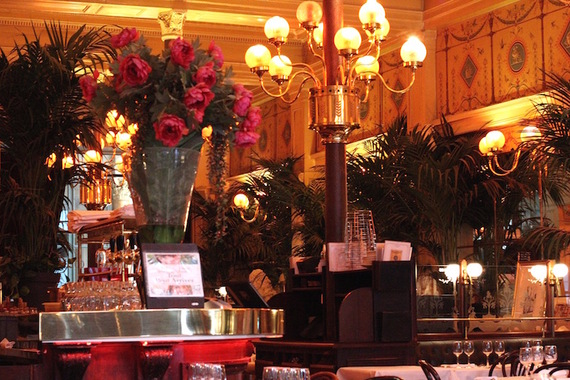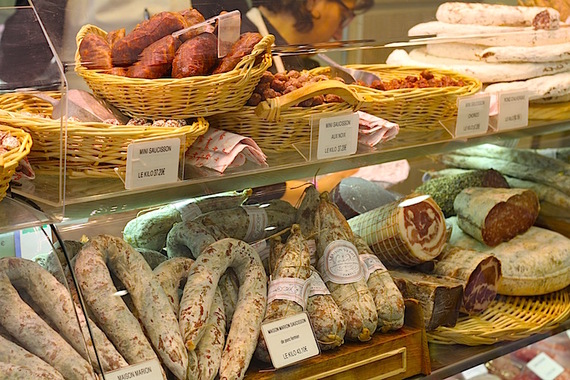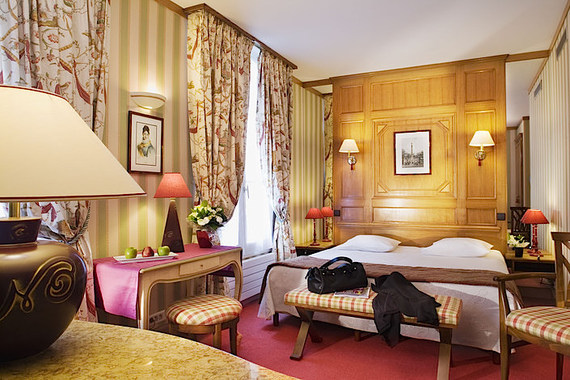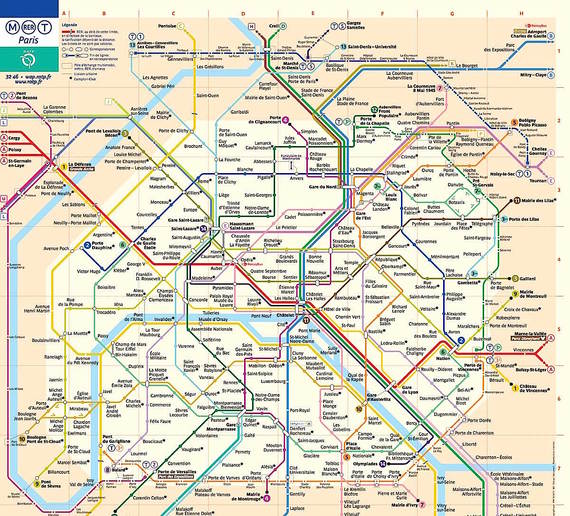As the song says, "I love Paris in the springtime. I love Paris in the fall. I love Paris in the winter when it drizzles. I love Paris in the summer when it sizzles."
I suspect most people do. But I love Paris most of all when it is affordable, which it has not been for many years . . . until now. The dollar has strengthened formidably against the euro--$1.10 to the euro as I write this--and if Greece leaves the EU, all bets are off.
More important, the hotels and restaurants of Paris have been careful to maintain, even to trim, prices so as to maximize patronage. In the past, lunch and dinner prices were usually the same, but increasingly many of the best bistros are offering very appealing fixed price menus for a three-course meal (sometimes with a glass of wine), tax and service for 25 to 40 euros.
For instance, the very popular Le Grand Colbert (above), where Jack Nicolson met Diane Keaton for her birthday in the 2003 film "Something's Gotta Give," offers a three-course 37 euro lunch and after 10:30 p.m. At Guy Savoy's delightful Les Bouquinistes, lunch runs only 36 euros, with a glass of wine. That's about $US40.
The best list of good places with inexpensive meals is the Michelin Guide's Bib Gourmand listings for 650 Paris restaurants with "cuisine of quality" at a maximum price of 36 euros. 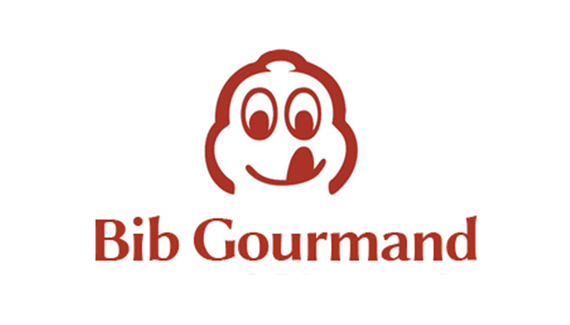
But even some of the top-rated, deluxe restaurants now offer remarkable prix fixe menus: The illustrious Taillevent offers "Le Menu Tirel" that includes an apéritif, three-course meal, half-bottle of wine, coffee, mineral water, tax and service for 120 euros ($133). Compare NYC's Jean-Georges at $128 for three courses--but no apéritif, no wine, no coffee, and you have to pay tax on top of that, plus a 20% tip. London's Alain Ducasse at The Dorchester will cost you £95 ($148), without wine, tax and service.
You can also eat splendidly at bakeries, crêperies, and charcuteries where you can make a delightful meal from a sandwich or a few slabs of terrine. One of the most famous Parisian charcuteries, Maison Gilles Vérot (above) serves wonderful take-out items, and at La Maison Croque Monsieur on Rue Montparnasse you'll find the ultimate French sandwich--ham and melted cheese.
As for hotels in Paris these days, the secret is to find a time when the city is not having a major exhibition or show: Last year Paris hosted 976 congresses. Paris Fashion Week is held in April and again in September. The largest of all is the Paris Air Show, with 2,300 exhibitors from 48 countries and delegations from 91.
Finding a hotel room anywhere in Paris is not only difficult at those times but prices will be hiked in response to demand.
You know as well as I the myriad hotel websites available to book a room, but I must say that Trivago really does have the best comparison shopping. For July on that site I'm seeing on that site for July some very pleasant hotels (pegged at a distance from the Eiffel Tower--0.7 miles, 1.9 miles, etc.) for as low as $77, with plenty at $100 per night. A peek at the Hotel Fleurie (above) in St. Germain des Prés for $124 shows what appears to be sumptuous rooms with a charming view of the city, half a mile from city center.
The Paris Métro, which has never been more dependable and cleaner, is priced according to how far you travel. You save money with a ten-ticket carnet for 13.30 euros.
And what about tipping? It exists in Paris, but not in the flagrant way it does when Americans think they have to tip everyone in sight. Here's the deal: In hotels and restaurants a service charge is built into the bill (as is the VAT tax). So, say your restaurant check is 100 euros; of that amount, 10 euros will be for the VAT, and 12 for service. The latter does not go to the waitstaff at the end of the night because they are paid a set wage. Therefore, you need not tip anything at all, although leaving a few small coins at a café (called a pour-boire) or rounding off the bill for a taxi is customary. If, however, you have that 100 euro tab with the service built in, leaving more than a few euros is either showing off or being insecure
In hotels it is the same. Invariably guests tip the fellow who delivers their baggage, but no more than a euro per bag. Your hotel room already includes a 20% VAT and a service charge, so the people who clean your room are being paid a set wage.
As for the concierge, if all he's done is make a reservation, show you the route to the Louvre, or recommend a good shoe shop, there's no reason to. That's his job. But if he arranges for a table for an impossible-to-get-into restaurant or arranges for a private tour of the Louvre after hours, he should get a nice tip of about ten euros.
A Few Other Notes:
• It used to be better to get your euros from an ATM machine and to use credit cards instead of cash, but these days, in addition to the ATM service charge, you may find that when you get home you also pay a foreign transaction fee on your credit or bank card. That includes charges for hotels, restaurants and other payments. I still use the ATM, but only with a bank credit card that does not charge such a foreign transaction fee. And to avoid further service charges from the ATM, I try to take out enough euros one time only to last me through my stay.
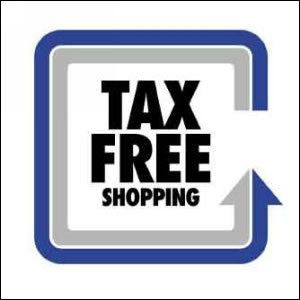
• The VAT refund on merchandise you bought can be a pain in the neck to file for when you get to the airport, and the refund is never as much as you thought it would be, but it's still a 20% tax that you, as a foreigner, need not pay. To make things a little easier, remember to carry your passport if you go shopping. Ask the merchant to fill out the "tax-free form" for you and attach your receipt. Some stores, which usually have a "Tax Free" sticker in their window, will offer to mail in your forms and give you a tax credit on your credit card, though they may charge a fee.
• Take your purchases with you. Unless it's a piece of furniture, don't ask them to ship it because costs will be outrageously high.
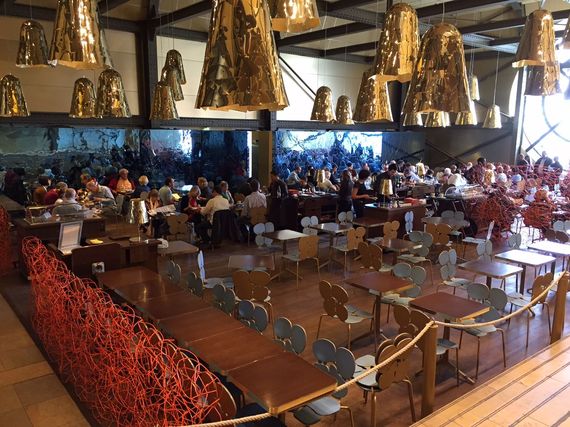
• Parisians take their culinary reputation very seriously, even for their museum restaurants, offer very good value for delicious food. The Musée d'Orsay (above) has three--Restaurant, with 22 euro and 32 euro meals; Café de l'Ours for salads, sandwiches and pastries; and Café Campana for brasserie fare.
• Always ask about Wi-Fi charges! Today most hotels offer it free, but some do not, and you may wind up paying a 25 euro charge for less than a day's coverage. Paris itself is well wired, so there are plenty of hot zones outside the hotels.
• Breakfast is often included in hotel room prices, but make sure you ask. If not, it is much better to go around the corner to a pastry/bakery shop or café and have a fresh croissant and coffee for a few euros.
